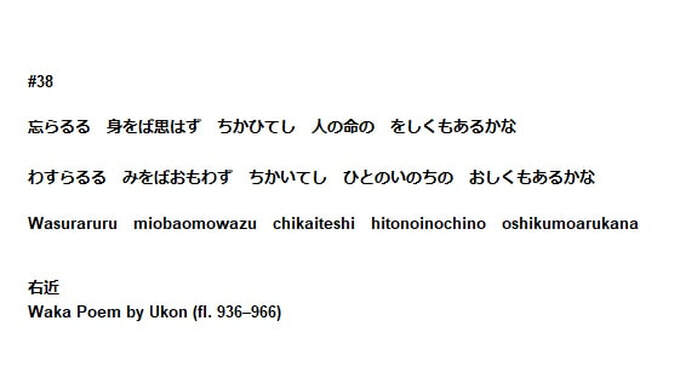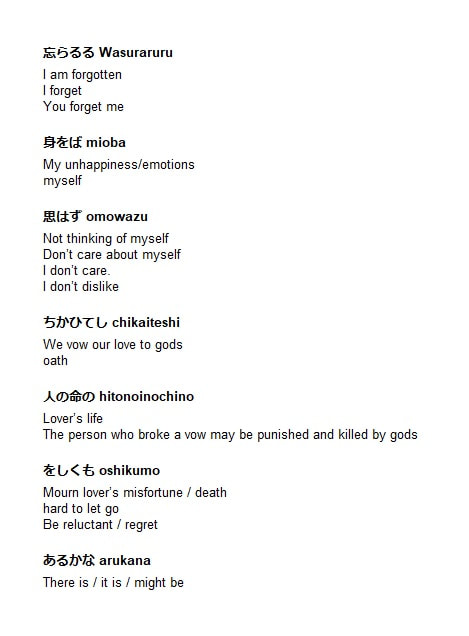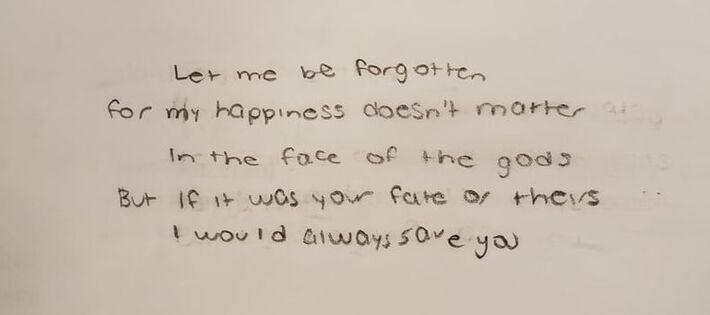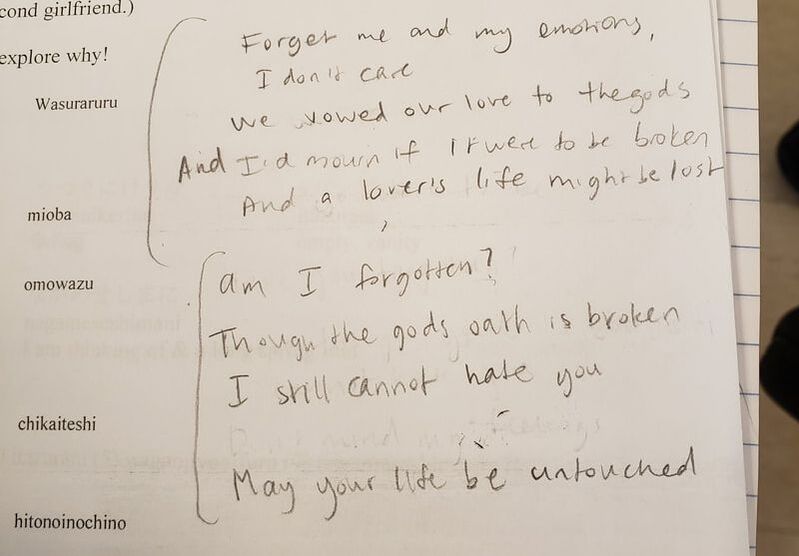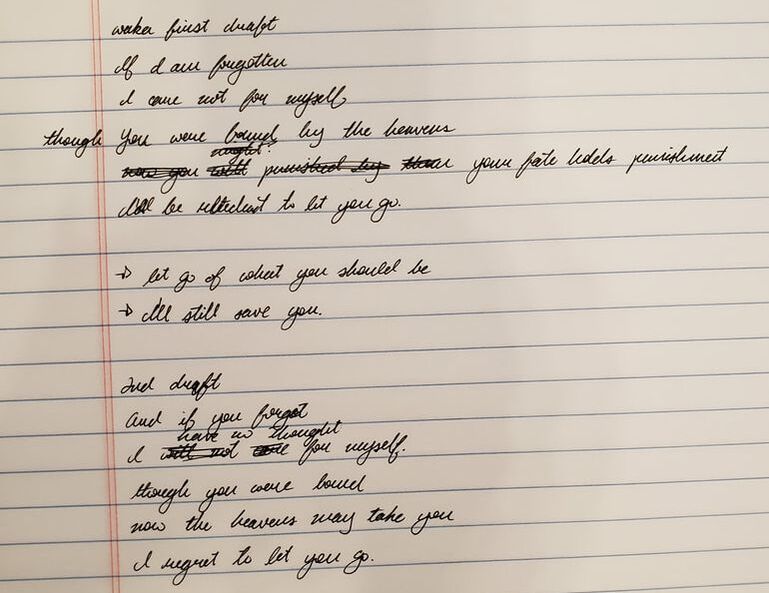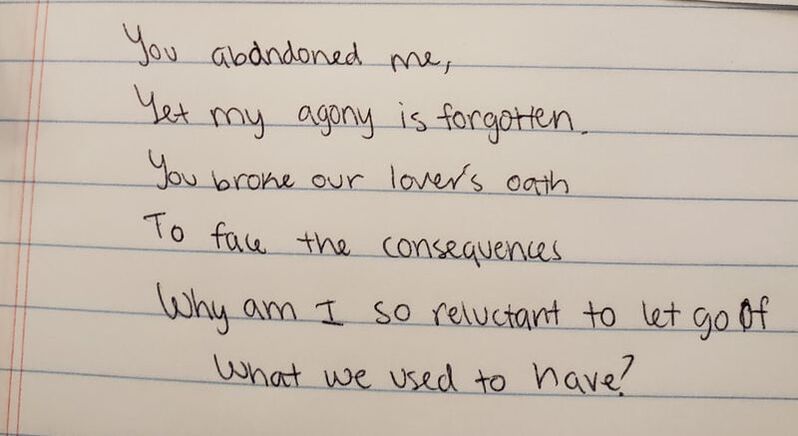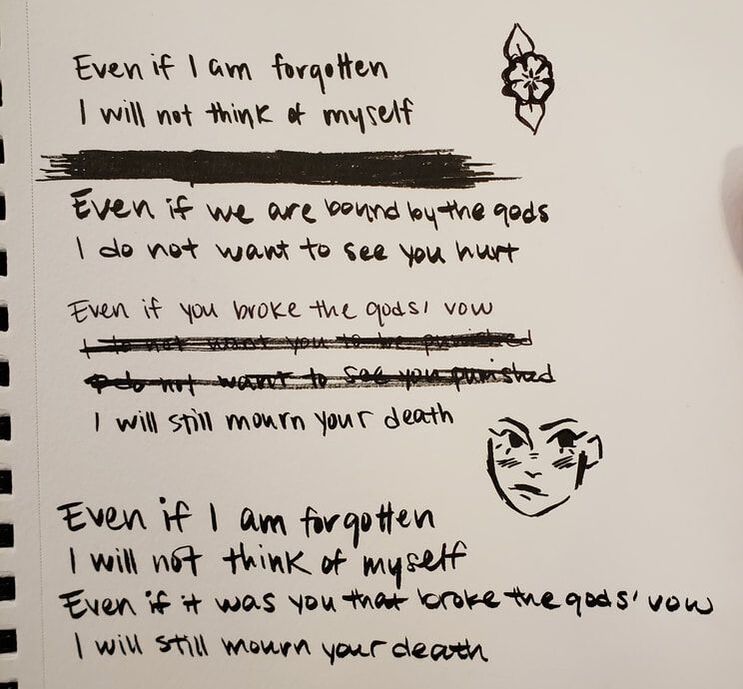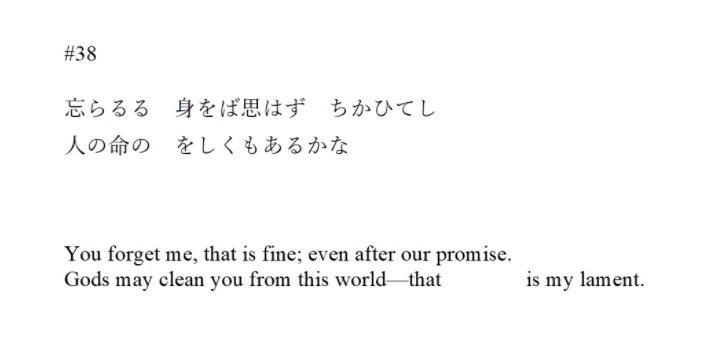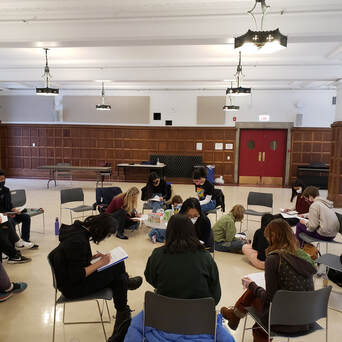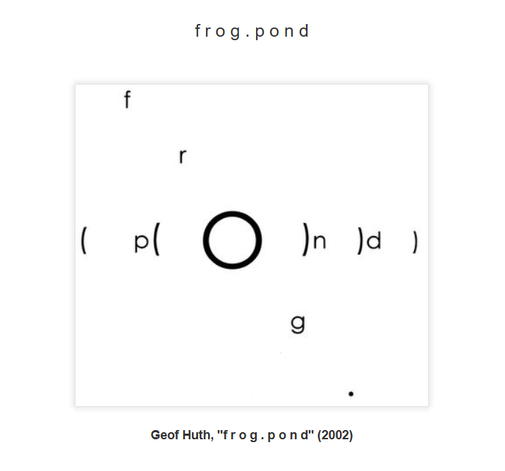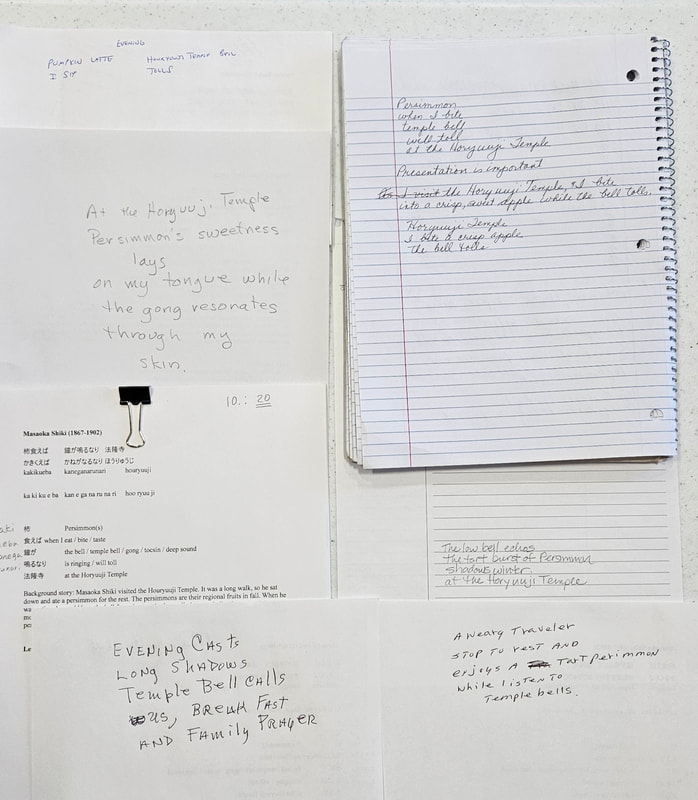1) Waka Translation Workshop
We are going to translate #38 from the Ogura Waka Anthology in group work (each group has 4 people; participants are from 12 years old to 17 years old). We will make several versions of waka translations!
Summary:
I do not mind unhappiness, even if you stop visiting & loving me. Though you vowed to god (like wedding vows) to continue loving me, I cannot bear to think about you being punished for breaking it. (And Ukon was the second girlfriend. Her boyfriend had a sick wife.)
I do not mind unhappiness, even if you stop visiting & loving me. Though you vowed to god (like wedding vows) to continue loving me, I cannot bear to think about you being punished for breaking it. (And Ukon was the second girlfriend. Her boyfriend had a sick wife.)
Usually, waka poem is composed by 5-7-5-7-7.
However, #38 is 5-7-5-7-8.
Students focus on two things for this workshop:
*
Previous Example:
WHY did the author (#9 Ono no Komachi) decide to add one extra syllable?
However, #38 is 5-7-5-7-8.
Students focus on two things for this workshop:
- How do they approach one additional Japanese syllable from the original text?
- How do they express their translations in poetic form and English language?
*
Previous Example:
WHY did the author (#9 Ono no Komachi) decide to add one extra syllable?
Group Exercise:
#1) Group decides on a poetry format:
- 5-7-5-7-7 English syllable counting
- Free verse
#2) 7 minutes to write a first draft:
- The team creates a first draft using the following word list
- Each member may work by themself first, and combine their ideas together in the end
#3) All groups share their first draft with a quick presentation:
#4) 15 - 20 minutes to create final drafts:
#5) Final presentations:
- Exchange ideas
- Share and ask questions
#4) 15 - 20 minutes to create final drafts:
#5) Final presentations:
- Groups show their translation and explain their process
- How they decide English syllable counting
- How they express the extra syllable from the original text
It is extremely interesting to review all the students' works.
They translated the same waka poem #38; however, there are multiple ways to tell this love story. Each example reflects its translator's personality and word choices. Some use poetically attractive words, and some choose academically rigid words.
For students, this translation process is like solving puzzles or playing an investigation game. They have fun, quality time to find the right words for describing this waka. Put another way, students own their interpretations and celebrate their final products.
Here is my translation of #38.
They translated the same waka poem #38; however, there are multiple ways to tell this love story. Each example reflects its translator's personality and word choices. Some use poetically attractive words, and some choose academically rigid words.
For students, this translation process is like solving puzzles or playing an investigation game. They have fun, quality time to find the right words for describing this waka. Put another way, students own their interpretations and celebrate their final products.
Here is my translation of #38.
This waka has one extra syllable (5-7-5-7-8). The author plays with a hard realistic image, "hitonoinochi, lover's life", and a soft ending. The ending was written in all hiragana and she shows her regrets with the extra syllable. Therefore, I wanted to show her mixed emotions in my translation. I use "clean you" -- a bit harsh idea in the first section. Then I introduce a dash and white space to express the extra syllable. I consider "My lament" as a soft ending, like Ukon approached.
*
I wonder again what the most important element about the translation process is.
How far can we reach beyond the original text?
And again,
"Is a translator, traitor?"
But students spark when they look for images and words in English. For them, the translation process accesses their creativity.
I wonder if translators do not have fun, they may not be able to move readers' emotions.
*
I wonder again what the most important element about the translation process is.
How far can we reach beyond the original text?
And again,
"Is a translator, traitor?"
But students spark when they look for images and words in English. For them, the translation process accesses their creativity.
I wonder if translators do not have fun, they may not be able to move readers' emotions.
2) Haiku Translation Workshop
Matsuo Bashō (1644-1694)
古池や 蛙飛び込む 水の音
ふるいけや かわづとびこむ みずのおと
furuikeya kawazutobikomu mizunooto
fu ru i ke ya ka wa zu to bi ko mu mi zu no o to
古池や 蛙飛び込む 水の音
ふるいけや かわづとびこむ みずのおと
furuikeya kawazutobikomu mizunooto
fu ru i ke ya ka wa zu to bi ko mu mi zu no o to
Translation Example 1:
Old pond - frogs jumped in - sound of water.
Translator: Lafcadio Hearn / Yakumo Koizumi (1850-1904) was a Greek-Irish writer, translator, and teacher who lived in Japan. Especially he is famous for his collections of legends and ghost stories, such as Kwaidan: Stories and Studies of Strange Things.
*
Translation Example 2:
The ancient pond
A frog leaps in
The sound of the water.
Translator: Donald Lawrence Keene (1922-2019) was an American-born Japanese scholar. He retired from Columbia University, moved to Japan permanently, and acquired citizenship.
*
More examples from online resources:
・The old pond; A frog jumps in —The sound of the water.
・The old pond, aye! And the sound of a frog leaping into the water.
・The old pond. A frog jumps in. Plop!
・An old silent pond. A frog jumps into the pond, splash! Silence again.
*
Translation Example 3:
Old pond - frogs jumped in - sound of water.
Translator: Lafcadio Hearn / Yakumo Koizumi (1850-1904) was a Greek-Irish writer, translator, and teacher who lived in Japan. Especially he is famous for his collections of legends and ghost stories, such as Kwaidan: Stories and Studies of Strange Things.
*
Translation Example 2:
The ancient pond
A frog leaps in
The sound of the water.
Translator: Donald Lawrence Keene (1922-2019) was an American-born Japanese scholar. He retired from Columbia University, moved to Japan permanently, and acquired citizenship.
*
More examples from online resources:
・The old pond; A frog jumps in —The sound of the water.
・The old pond, aye! And the sound of a frog leaping into the water.
・The old pond. A frog jumps in. Plop!
・An old silent pond. A frog jumps into the pond, splash! Silence again.
*
Translation Example 3:
Translator: Geof Huth is a poet and visual poet who writes daily on visual poetry and related matters at dbqp.blogspot.com. His recent books are Out of Character (Paper Kite Press, 2008), Longfellow Memoranda (Otoliths, 2008), and texistence (co-written with mIEKAL aND, from Xexox Sutra Editions, 2008.
Masaoka Shiki (1867-1902)
柿食えば 鐘が鳴るなり 法隆寺
かきくえば かねがなるなり ほうりゅうじ
kakikueba kaneganarunari houryuuji
ka ki ku e ba kan e ga na ru na ri hoo ryuu ji
柿 (Kaki) Persimmon(s)
食えば (kueba) when I eat / bite / taste
鐘が (kanega) the bell / temple bell / gong / tocsin / deep sound
鳴るなり (narunari) is ringing / will toll
法隆寺 (Horyuuji) at the Horyuuji Temple
Background story: Masaoka Shiki visited the Houryuuji Temple. It was a long walk, so he sat down and ate a persimmon for the rest. The persimmons are their regional fruits in fall. When he was eating, he could hear the bell from the temple. It usually has two bells (deep sound) in the morning and evening. So he may be tired in the evening, sat down by a local tea house, and ate a persimmon. With the sunset and surrounding autumn nature, he felt the season.
Let’s translate!
柿食えば 鐘が鳴るなり 法隆寺
かきくえば かねがなるなり ほうりゅうじ
kakikueba kaneganarunari houryuuji
ka ki ku e ba kan e ga na ru na ri hoo ryuu ji
柿 (Kaki) Persimmon(s)
食えば (kueba) when I eat / bite / taste
鐘が (kanega) the bell / temple bell / gong / tocsin / deep sound
鳴るなり (narunari) is ringing / will toll
法隆寺 (Horyuuji) at the Horyuuji Temple
Background story: Masaoka Shiki visited the Houryuuji Temple. It was a long walk, so he sat down and ate a persimmon for the rest. The persimmons are their regional fruits in fall. When he was eating, he could hear the bell from the temple. It usually has two bells (deep sound) in the morning and evening. So he may be tired in the evening, sat down by a local tea house, and ate a persimmon. With the sunset and surrounding autumn nature, he felt the season.
Let’s translate!
- You decide to use synonyms of the listed words.
- You have the freedom of making line-breaks.
- Visual poems are also welcome.
